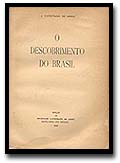


|
ABREU,
J. Capistrano de. O descobrimento do Brasil.
Annuario do Brasil,1929.
João Capistrano de
Abreu was born in the province of Ceará in 1853. Like many of his
contemporaries from the "North" of the Empire, when still young he headed
for Recife, where he failed to enter the traditional Law School. In 1875
he arrived at the Imperial Court, where personal contacts managed to engage
him as a journalist. It was especially as editor of the Gazeta de Notícias
that Capistrano de Abreu was able to dedicate himself to criticism and
produce texts on the history of literature, taking part in the polemics
that were the tonic of Rio de Janeiro's intellectual life. Appointed by
merit to the staff of the National Library, he began to conduct systematic
and constant historical research, lending form and content to the idea
nourished since his Ceará days, to write the history of Brazil "in
large letters and wide mesh." In 1883 he left the National Library
for the Pedro II Imperial College, after a public examination that was
to make him famous, attended by Emperor Dom Pedro II himself. His dissertation
on the "Descobrimento do Brasil. Seu desenvolvimento no século
XVI" concluded that the Spanish were the first to reach Brazil
but that sociologically speaking, those who discovered Brazil were the
Portuguese. It is with them that our history began, and through them continued
for centruries, and it was chiefly their effort that produced a modern,
civilized nation in a land that was formerly peopled by tribes of brutish
nomands.
For six years Capistrano
taught at the model establishment, which he left in disagreement over the
reform that annexed the history of Brazil to world history. From then on
he devoted himself almost exclusively to researching and writing the history
of Brazil. Published in 1907, the Capítulos de História
Colonial consecrated him definitively as one of Brazil's foremost
historians. As Ricardo Benzaquen de Araújo points out, Capistrano
is the historian who perhaps incarnates better than anyone else the ideal
of the "modern" search for the truth, as well as having always shown enormous
interest in the work of French and English sociologists like Taine, Comte,
Buckle and Spencer, an interest that later extended to authors associated
with anthropology and geography, mainly those of the German school, a condition
for what in his opinion should define the task of the historiographer,
that is, interpreting in order to reveal meaning.
In O descobrimento do
Brasil – the 1929 edition of the Sociedade Capistrano de Abreu – there
appear two papers on the same subject written at different times: the dissertation
for the position at the Pedro II College, penned in 1883, and the "O
Descobrimento do Brasil – Povoamento do Solo – Evolução Social",
the text that opens the first volume of the Book of the Centenary, 1500-1900,
published seventeen years later. Reading both texts allows one much more
than simply to know how the writer from Ceará resolved most of the
so-called "controversial points" of the Discovery of Brazil by practising
the "critical method". Among other things, comparing both texts allows
us to understand the two dimensions of the task of historiography in what
is usually called the modern conception of history - critical method and
meaningful narration - a task performed with such intensity by Capistrano
de Abreu.
|



